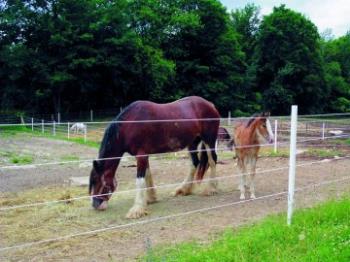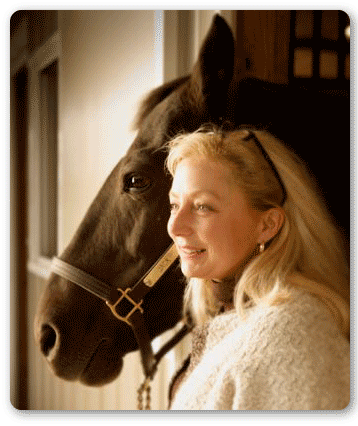Fencing Considerations for Dry Lot Areas

The old saying, "the grass is greener on the other side" takes on very realistic meaning for your horse. To get to grass your horse can see (or smell), he may practically lie down or push through your fence rails to get to fresh grazing. Consequently, your fence becomes a "high traffic" zone and may require some special attention.
Rotational grazing is one of the best long-term solutions, if you have the land available. This practice allows one pasture to rest and regenerate while the other one is being used. Horses can freely graze and are less likely to damage your fence trying to get through it.
If your circumstance can't accommodate rotational grazing, you need to make sure you have a fence system that will hold up to your horses' attempts to push through it. Flexible rail continuous run fences with high break strength are a good option. While traditional fences can break or come apart at the post where a rail is attached, continuous rail is one unbroken stretch of fence. When a horse leans on it, the continuous rail slides through brackets without creating a pressure point at each post. Flexible rails with high tensile wire have "memory" and will flex back to their original shape.
In some situations, horses can become so abusive that you may need to add electric wire to protect the investment you have in your fence. In addition, you may need to experiment with providing your horses with grass hay between regular feedings.
 Debbie has over 45 years experience with horses and equine-related businesses. She has owned, trained, boarded horses and run stables at various times in her career. She is a certified fence installer, has given balanced riding lessons, and has shown horses in Western, Western Pleasure, Trail, English, Hunter/Jumper, Fox Hunting, Hunter Trials, Dressage and driving classes. Debbie has been involved in foaling, and just about every aspect of horse ownership possible, and she welcomes your questions and comments. If you are interested in using any articles by Debbie, please send her an email.
Debbie has over 45 years experience with horses and equine-related businesses. She has owned, trained, boarded horses and run stables at various times in her career. She is a certified fence installer, has given balanced riding lessons, and has shown horses in Western, Western Pleasure, Trail, English, Hunter/Jumper, Fox Hunting, Hunter Trials, Dressage and driving classes. Debbie has been involved in foaling, and just about every aspect of horse ownership possible, and she welcomes your questions and comments. If you are interested in using any articles by Debbie, please send her an email.
